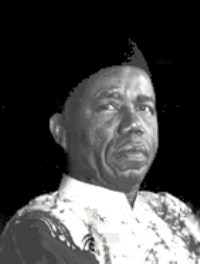Persons *=divine or supernatural
+=deceased
-A-
*Agbala, oracle of the hills and caves
Ajofie, leading egwugwu of Umofia
Akueke, Maduka's sister, the bride
Akunna, great man, befriends missionaries
Amadi, the leper
*Amadiora, god of the sky
Amalinze, wrestler beaten by Okonkwo
Amikwu, Okonkwo's cousin, eldest of Uchendo's five sons, sees Nwoye at church
Anasi, Nwakibie's first wife
Aneto, hanged by the white men
*Ani, the earth goddess
-C-
Chielo, priestess of Agbala
*Chukwu, chief god
-E-
Egonwanne, a coward hated by Okonkwo
EKWEFI, OKONKWO'S SECOND WIFE, EZINMA'S MOTHER
Ekwensu, great man of Uli
*Ekwnesu, evil spirit
Enoch, convert, may have killed python
Ezeani, priestess of the goddess Ani
EZINMA, EKWEFI'S FAVORITE DAUGHTER
Ezuedo, elder who dies in village, his son is killed by Okonkwo's gun
-I- Ibe, Akueke's suitor
*Idemili, a god
Igwelo, Nwakibie's son
Ikemefuna, the captive boy
+Iweka, Obierika's father
-M-
Maduka, the successful wrestler
*Mgbafo, woman figure in ceremony
Mr. Brown, white missionary
Mr. Kiaga, interpreter for the missionaries
Mr. Smith, Rev. James Brown's successor
-N-
Njide, Amikwu's eldest daughter
Nkechi, daughter of Ojiugo
Nneka ("mother is supreme") first child born to Okonkwo in exile
Nwakibie, rich man who lent seen yams
Nweka, Obierika's son
Nwofa ("born in the wilderness") first son born to Okonkwo in exile
NWOYE, OKONKWO'S SON BY OJIUGO (RENAMED ISAAC)
-O-
Obiageli, Ojiugo's daughter
Obiako, palm wine tapper |
OBIERIKA, OKOWYE'S FRIEND, MADUKA'S FATHER
Oduche, killed by Aneto in fight over land
Odukwe, Mgbafo's brother Ogbuefi Udo, his wife was murdered
Ogbuefi Ugonna, "worthy man", a convert
Ogbuefi Ejkwueme, defends the burning of the church
Ogbuefi Ezuago, powerful orator
Ogbuefi 'Ndulue, old man who died in Ire
*Ogwugwu, god
Ojiugo, Okonkwo's third wife
Okadigbo, father of Nweke's wife
Okagbue, the man who dug up the iyi-uwa
Okeke, snuff seller
Okeke, counsels moderation when the python is killed
Okeke, Mr. Smith's interpreter
Okika, one of the imprisoned
Okoli, convert accused of killing python
+Okolo, founded Okonkwo's mother's family, 200 years ago
OKONKWO, CENTRAL CHARACTER
Okowye, lent Unoka money
+Okudo, chanter of war songs
*Okwugwu, a god
Onyeka, speaker at the final debate
Otakagu, great man of Imo
Ozoenena, Ogbuefi 'Ndulue's wife
-U-
Uchendu, eldest member of Okonkwo's mother's family who shelters him
Ukegbu, Ibe's sister
*Umeru, Evil Forest
Unoka, Okonkwo's father
*Uzowulo, Mgbafo's husband
Places
Abame, where white man on iron horse was killed
Aninta, village
Elmelu, village
Iguedo of the yellow grinding stone, Okonkwo's village
Ikeocha, village
Imo, village
Ire, village
Mbaino, where girl was murdered
Mbanta, Okonkwo's mother's village to which he flees
Obodo, home of Amikwu's wife
Uli, village
Umuazu, village
UMUOFIA, THE CLAN, THE VILLAGE
Umaru, on the Great Rive, missionaries home base. |
